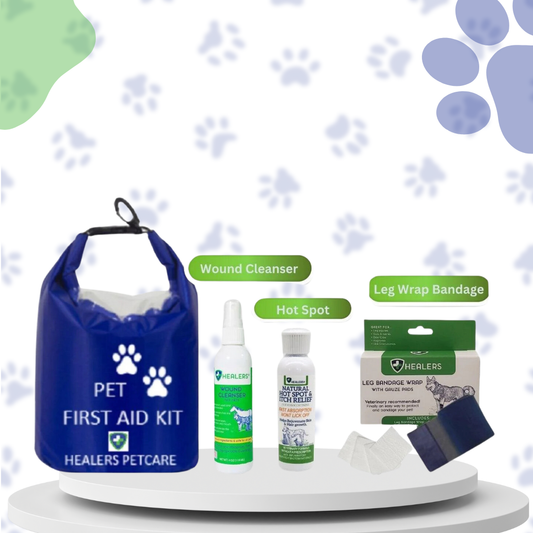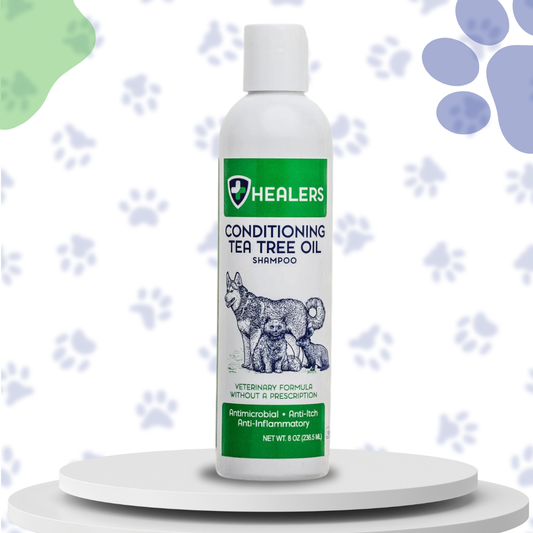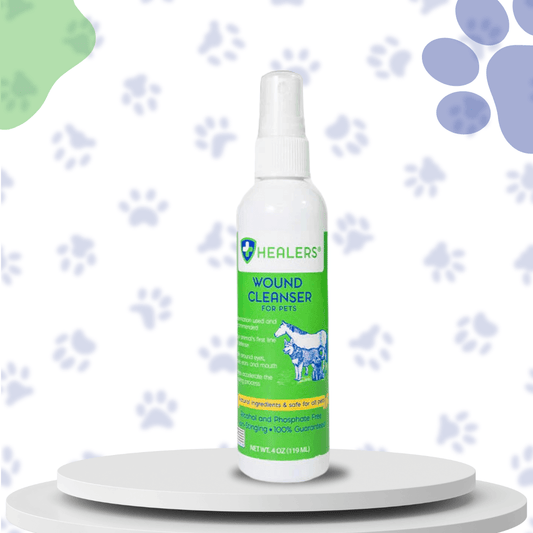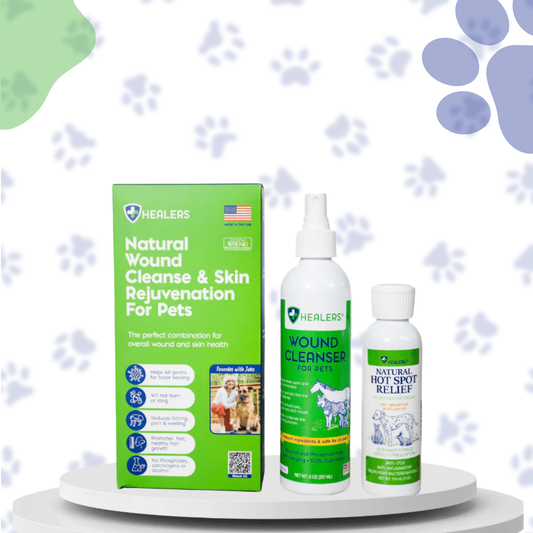Paw Hygiene: 10 Things Every Dog Owner Needs to Know
Share

As a dog owner, caring for your pup's paw hygiene is essential. Properly maintained paws can help prevent and treat infections, injuries, and other common health issues.
Dogs’ paws are specially adapted to walking on all types of surfaces. Their claws help them tear through roots and soil to get food, and their paw pads help them avoid falling into mud puddles or rainstorms.
Proper paw hygiene starts with keeping your dog clean. Clean their paws with a good quality dog bath soap or shampoo every day, or at the very least once a week.
There are several things every dog owner should know to keep their pup’s paws in top shape. The following tips will help keep your dog's paws healthy and clean.
1. Regularly Clean Between Toes
To keep your pup's paw pads healthy, you should regularly clean between the toes. Use a damp washcloth or soft-bristled brush to gently wipe away any dirt or residue from the crack of their paws to prevent any health concerns. Dirt and debris trapped between the paws can cause infections if not properly removed.
Regularly cleaning between your pup's toes is an important step in keeping their paws hygienic. Make sure to clean between their toes every time, and use mild soap and warm water to avoid irritation. You can use a damp cloth between their toes to help remove dirt. After cleaning, dry their paws, especially between the toes, to reduce the risk of disease.
2. Keep Nails at the Right Length
An essential factor in their paw hygiene is keeping their nails short to prevent cracking and splitting, which can lead to infection if left untreated. Make sure you only use pet clippers designed explicitly for trimming dog nails, as these will help avoid any pain or discomfort to your pup.
Keeping your pup's nails at the proper length is essential to keeping their paws healthy and hygienic. Overly long nails can cause your pup's paws more susceptible to injury, making it harder for them to walk.
Use a dog nail clipper regularly to keep your puppy's nails trimmed. Aim to keep the length short enough that they do not touch the ground while walking. Additionally, make sure to use a sharp, clean clipper and trim in one swift motion.
3. Check for Splinters and Cuts

HEALERS MEDICAL DOG BOOTS
During playtime or outdoor adventures, your pup could pick up splinters and cuts on their paw pads. These should be checked immediately to prevent any infection from forming. Keeping an eye on cuts and properly caring for them using a product specifically designed for dogs is key to making sure they heal safely and quickly.
Also, check the between their paw pads especially during hot summer days to prevent any skin irritation that could be caused by muddy surfaces or hot pavements.
Checking for splinters and cuts is an important part of keeping your pup's paws hygienic. After each walk, inspect their paws for any cuts or splinters that may have been picked up.
If you notice any cuts, splinters, or other injuries, it is important to clean the wound with warm water and mild soap and then apply an antibiotic ointment. Additionally, you may need to wrap the paw in a bandage or splint to help keep the wound clean and protect it from further injury.
The Healers Medical Boots boxset is the perfect solution if your pet sustains an injury and requires paw bandaging. They are easy to put on, maintain wound care, and change. They come with triple-layered gauze inserts, these booties act as a bandage for your dog’s paws, absorbing moisture and allowing you to apply medicine if needed. Made with soft and comfortable fabric, these booties will feel like slippers for your dog!
You can use a retractable dog gate to keep your dog in a safety barrier, so they don’t fall into danger outside. This will also help them play around and enjoy the sights inside the home.
4. Protect Paw Pads From Environmental Damage
Protecting your pup's paws from environmental damage is just as crucial as any grooming or hygiene routine. This means avoiding hot pavements, sharp stones, and aggressive surfaces that can cause discomfort and even lead to illness.
Invest in protective booties or wax treatments before long walks or hikes to ensure their paws stay safe. Regularly check that the pads are clean of dirt, debris, and stones afterward too.
5. Use a Dog-Friendly Moisturizer or Salve on Paws Regularly
Keeping your pup’s paws moisturized and nourished is important for skin health. Some salves or lotions specialized for dogs can help protect and nourish in one go.
Look out for products with natural ingredients like coconut oil, shea butter, and oatmeal extract that are designed to be gentle on delicate skin. Apply regularly, particularly after being in the water or outdoors, as wet skin can be more prone to irritation.
These ingredients can help to keep your pup's paws soft, moisturized, and protected from environmental damage. These products can also help to soothe any existing skin conditions, such as allergies or dryness.
If your pup sustains an injury,
6. Use Paw Wax or Protective Booties

Using paw wax or protective booties effectively keeps your pup's paws clean and hygienic. Paw waxes provide a protective barrier against moisture and irritants, while booties protect against sharp objects and extreme temperatures. It's important to ensure that the wax or booties are the right size and fit for your pup's paws and to use them regularly.
You can use paw wax to prevent salt, chemicals, snow, and ice from coating your pup's paws. This wax helps create a hydrophobic barrier between your dog's paws and the ground, preventing any potentially harmful substances from being absorbed.
Additionally, protective booties, like Healers Urban Walker III, can help protect your pup's paws from the elements and provide extra grip on slippery surfaces.
7. Provide Proper Nutrition
A balanced diet of high-quality, nutrient-rich foods helps to keep your pup's paws strong and resilient, as well as their overall health. Maintaining the health of your pet's paws requires the right amount of vitamins, proteins, carbohydrates, fats, and minerals. Additionally, providing adequate exercise is important to keep paws limber and strong.
Providing proper nutrition to your pup is a great way to keep their paws healthy and hygienic. You should also ensure that they have access to fresh, clean water to keep their paws hydrated. Finally, speak to your veterinarian to determine your pup's specific nutritional needs, and look for pet food products that meet the AAFCO guidelines.
8. Use Lawn Care Products Safely
Using lawn care products safely is crucial to keeping your pup safe. Pet-safe products should be listed on labels, and non-pet-safe ones should be avoided.
Pets and children should not be exposed to such products and should be monitored outdoors. Also, try to avoid walking your pup on lawns recently treated with lawn care products, and always wipe down their paws after a walk.
Discuss pet-safe options with the landscaping company if you plan to use lawn chemicals on your own property. Consider dog parks rather than general park areas when looking for properties with lawn treatment signs or flags.
In addition, remove your shoes at the door as soon as you get home to avoid introducing chemicals into your home.
9. Provide Regular Exercise
Regular exercise helps keep their paws strong and limber and improves their overall physical and mental health. Regardless of your pup's age, breed, or activity level, it's important to ensure that he is getting adequate exercise.
Exercise helps keep your pup's joints and muscles strong while providing mental stimulation. Make sure your pup gets at least 30 minutes of exercise a day. Keep walks short and slow to avoid over-exerting your pup.
Additionally, try to avoid excessively hot or cold surfaces, and always keep an eye out for sharp objects or debris that could injure their paws.
10. Be Aware of Potential Dangers
A pup's paws can be affected by potential dangers. These dangers can include hot pavement, lawn care chemicals, bacteria, viruses, fungus, allergies, burrs, sand rash, hot sand, rough pool surrounds, and road salt. Knowing these dangers is important.
To mitigate these dangers, avoid walking in extreme temperatures, keep an eye out for any potential irritants, and always wipe down your pup's paws after a walk.
You should also ensure to keep young children from taking dogs for walks. They often aren’t concerned about danger and hazardous road conditions. If they want to play with the dog, make it within your sights.
Conclusion
Keeping your dog's paws safe is essential for their health and well-being. Regular paw washing, nail clipping, brushing, and dental hygiene are all important steps to keep your pup's paws in good condition.
Additionally, it is essential to provide regular exercise, a clean and safe living environment, and to be aware of potential dangers when they are outside. Your pup's paws will remain healthy and hygienic with the right care and attention.
Blog submitted by guest author, Shawn Richard






1 comment
GREAT INFORMATION!🐾❤️